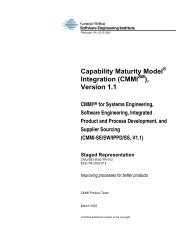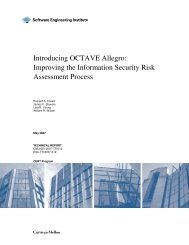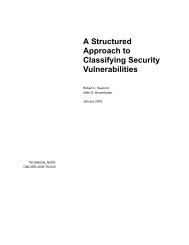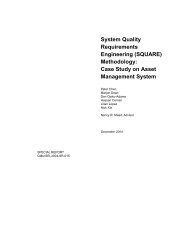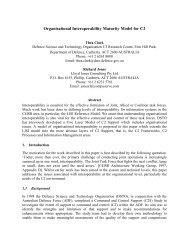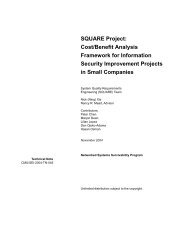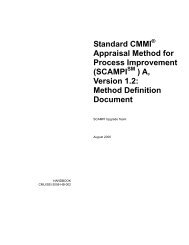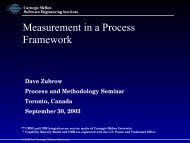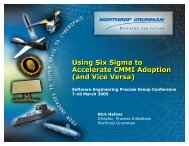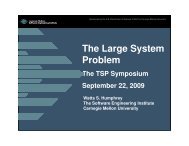State of the Practice of Computer Security Incident Response Teams ...
State of the Practice of Computer Security Incident Response Teams ...
State of the Practice of Computer Security Incident Response Teams ...
Create successful ePaper yourself
Turn your PDF publications into a flip-book with our unique Google optimized e-Paper software.
• integrity<br />
• operating system administration experience<br />
• programming experience<br />
• communication skills<br />
• security experience [Smith 94]<br />
Schultz provides a summary <strong>of</strong> <strong>the</strong> types <strong>of</strong> skills typically required in <strong>the</strong> CSIRT, including<br />
<strong>the</strong> need for strong management experience to lead <strong>the</strong> team and ensure that it is meeting its<br />
mission and <strong>the</strong> need for technical staff with pr<strong>of</strong>iciency in different applications, systems,<br />
and networks found in <strong>the</strong> team’s constituency. He also lists o<strong>the</strong>r equally important traits<br />
such as people, teamwork and communications skills, all <strong>of</strong> which contribute to effective interactions<br />
between <strong>the</strong> team and its constituency [Schultz 02].<br />
In addition to identifying <strong>the</strong> right skills for <strong>the</strong> CSIRT staff, Oppenheimer et al. suggest that<br />
some security precautions be implemented during <strong>the</strong> hiring process to screen resumes for<br />
“red flags.” Employers should perform reference and background checks, require new employees<br />
to sign appropriate non-disclosure agreements or acceptable use documents, and provide<br />
security awareness training as part <strong>of</strong> new-employee orientation [Oppenheimer 97].<br />
Smith also discusses <strong>the</strong> importance <strong>of</strong> paying careful attention to hiring regulations with regard<br />
to advertising, interviewing, and screening applicants. He raises <strong>the</strong> issues that management<br />
will need to determine if hired staff will be required to complete non-disclosure agreements<br />
and if <strong>the</strong>y will need security clearances to perform <strong>the</strong>ir work (depending on <strong>the</strong><br />
sensitivity <strong>of</strong> <strong>the</strong> constituency’s information) [Smith 94].<br />
Ano<strong>the</strong>r issue that CSIRT managers must take into consideration concerns any CSIRT staff<br />
members who will provide expert testimony in any judicial proceedings. If a team’s services<br />
include forensics evidence collection, <strong>the</strong>n <strong>the</strong> team members may be required to act as expert<br />
witnesses in court. This may require specialized skills and training for <strong>the</strong> analyst. Also,<br />
any staff member undertaking such tasks must be willing and able to stand up in court and<br />
provide <strong>the</strong> testimony.<br />
Having well-defined job descriptions that include a list <strong>of</strong> <strong>the</strong> roles and responsibilities for<br />
each <strong>of</strong> <strong>the</strong> CSIRT positions along with <strong>the</strong> necessary skills, experience, educational background<br />
and/or certifications and clearances required can be a helpful tool in identifying and<br />
hiring <strong>the</strong> right staff.<br />
CMU/SEI-2003-TR-001 77



